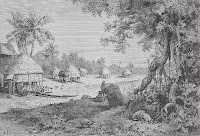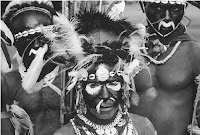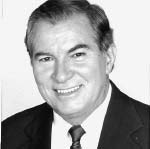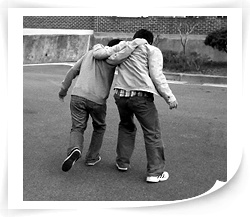
Thursday, January 18, 2007
Choose a representative passage from this novel that holds particular significence to you. Type it in and comment on its significance.

What reflections and connections can you make with this novel?

What concepts in the Sawi culture intregued / reviled / saddened / angered / surprised you?

What do mission organizations do for these people?

What should society do for “uncivilized cultures” like the Sawi?

What should we do when we are confronted with other cultures?(faith)

How does Faith relate to the world in which we live?

Faith includes a belief in anything that is internal, however, it is largely external factors that formulate our faith, and it is our environment that takes that role. Everyday experiences within certain environment largely shape the faith that one has. For instance, daily routine and interaction with the individuals within certain communities will influence what Faith you would have. As Sawi culture is distinct with our culture today, the faith in which we believe in is also far apart from one another. Faith guides the way how a person would act within certain situation, so without faith one would be in utter fear, and for Sawi, because they solely relied their faith in their traditional way of living, when they were encountered by the new kind of conflict, only three elderly people in the tribe were able to stand out to meet the Dutch boat that their ancestors never mentioned about. Thus, this reflects how Sawi derive most of their faith from the stories that are passed down from their ancestors. In contrast, our faith covers variety of subjects as they are derived from many different and distinct environments like Europe, America, and Asia. These differences allowed people to have more liberal view about the faith. In our world, faith acts as a fuel for our action, for instance, some people believe that working hard in school might lead to eventual success, in which, that faith enable to study them harder. While some, like Don Richardson, believes that spreading the words of God would save many people acts as a fuel for them to work.
Tuesday, January 16, 2007
How do I relate to faith? How did Don Richardson relate to Faith? How do the Sawi relate to faith?



The faith covers variety of concepts that it is sometimes complicated to develop the understanding of faith. The faith covers belief in anything, as code of ethics, standards, merits, and doctrines. In reading this book, I realized that Sawi’s faith was special one and they had strong faith in what they believed in. Sawi had faith in their traditional way of living; the belief that if they keep their living as the way that their ancestors did, they will be prosperous and could maintain their living. In keeping their faith, they had to live in accord to their accentors, thus, they continued with “practices” that descended from their ancestors. For instance, the people adopted Cannibalism, nomadic way of living, and created a society where treachery was a norm. Due to this unstable environment no one had enough courage and strength to challenge the environment established by the “authority”. Thus, their faith was well reflected in their actions. As for me, Sawi’s faith and my faith is somewhat similar because as an individual in the society, I tended to accept the common belief or faith established within the society, thus, Sawi and I were conformed to the way how majority believed in. However, the difference between Sawi from “our modern culture” was that our society with variety of community enabled to accept more of a difference between each community and allowed more liberal ideas to spread, that led to the progresses from our ancestry way of living. While the Sawi advocated traditional measures that they lived the way how their ancestors lived. Don Richardson’s faith was beyond ordinary, he had strong faith in God in which he even made a decision of giving up the security of the family as a household in order to spread the word of God. He had faith in God that he would protect him and his family as well on the journey to the dangerous society. I believe Don Richardson’s faith exceeded that of Sawi’s faith in keeping their traditional way of living because Don Richardson successfully converted many Sawi tribes into Christianity by speaking louder than that of Sawi faith that God was the savior of the World. In doing so, Don Richardson cleverly divided bits of information about Christ into Sawi cultural practices to enhance the understanding. Thus, his faith was strong enough to change the principle that the environment had been practicing for a long time.
